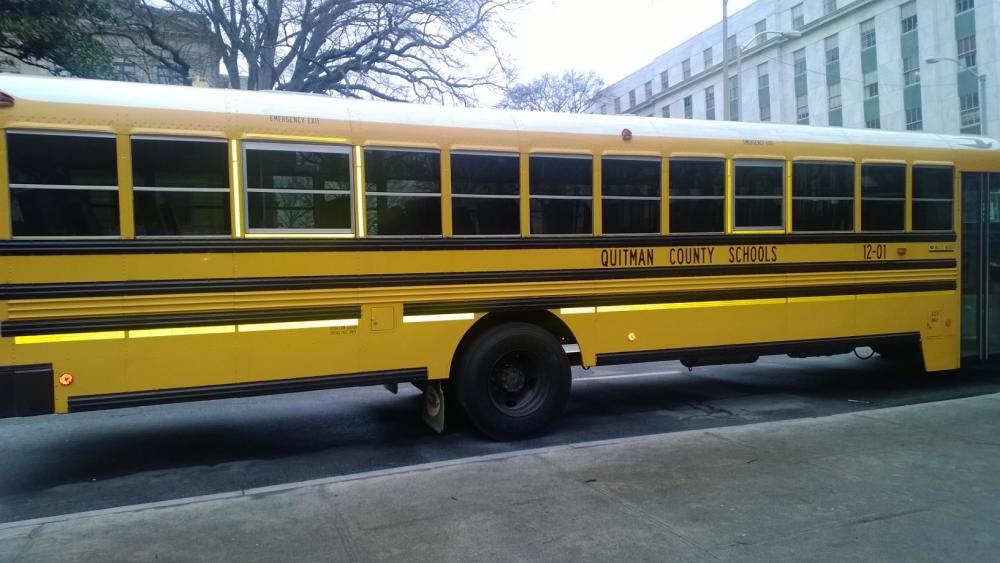
Section Branding
Header Content
Georgia's New Teacher Evaluation System Seen As 'Sea Change'
Primary Content

Education will continue to be on the front lines this fall in Georgia. And not only because it’s at the center of the gubernatorial race.
Georgia will be implementing a new mandatory statewide teacher evaluation system for the first time once the new school year begins.
The state has been conducting a pilot program with a fraction of Georgia’s school districts. In the fall, it goes live to all school districts.
“Until now, the state of Georgia has never had a required teacher evaluation system consistent across the state,” said Susan Andrews, deputy superintendent of Race to the Top at the Georgia Department of Education. “So, districts were using many kinds of systems, most of them with a binary rating, meaning a teacher would receive a satisfactory or an unsatisfactory.”
The new system will help ensure Georgia’s teachers are better preparing students for life after school. It also aims to eliminate ineffective educators by denying them the opportunity to renew their teaching licenses. Indeed, that element of the evaluation system is written into state law.
“I finally have a clear way to assess how I am doing, to see my areas of weakness, to see my areas of strength and to improve on them,” said Celis Hartley-Lewis, a Marietta High School science teacher, speaking at a conference Thursday in Atlanta organized by the Georgia Partnership for Excellence in Education.
She added, “It’s a very reflective process.”
The evaluation system will have ripple effects on every aspect of schooling in Georgia. Teacher training, for example, will become “clinical,” said Penney McRoy with the Georgia Professional Standards Commission.
“It looks more like preparation for a career in nursing now. Folks who begin a teacher education program start doing field experiments very early,” she told the audience at the event Thursday, which was entitled, “Georgia’s Sea Change Leading To Effective Teachers.”
Standards for gaining admission to teacher-training programs will also change, becoming more competitive.
The new evaluation system comes as Georgia is also implementing the Common Core standards, which have injected into the state’s education system not only curriculum changes but also controversy among right-wing conservatives. They’ve railed against the system because they say it’s federal overreach, and mounted an effort during the legislative session to bar Georgia from adopting the standards. The effort failed, in part because Common Core supporters pointed out that states like Georgia voluntarily elected to adopt the standards.
Nonetheless, the ‘sea change’ referenced in the event’s title is causing some concern for teachers. One retired educator who attended the event said collectively, the shifts could result in a ‘perfect storm’ of changes for teachers and thus students.
But experts say Georgia needs to do something, and fast, particularly in training teachers – and then students – in science, technology, engineering and math, known as the STEM fields.
“In the next four years, 17 percent of all job growth is going to be in STEM,” said Arthur Levine with the Woodrow Wilson National Fellowship Foundation, which trains teachers. “STEM is going to be a driver for Georgia’s future and economy.”
And he said that’s an opportunity Georgia needs to prepare for quickly.
“Georgia’s children aren’t performing as well as their peers in math, in high school graduation rates,” he told the audience. “There’s also an achievement gap for children by income, race, [and] geography. The children at the lower end of this gap, they aren’t ready for college and they aren’t ready for the work world.”
The educators who participated in Thursday’s panel hailed the coming changes. But they will take place as schools continue to struggle with budget shortfalls. At a Georgia Partnership for Excellence in Education event in January, lawmakers said they were shocked to find most school districts don’t have an 180-day school year and that 20 school districts were on the verge of bankruptcy.
But state lawmakers themselves have cut more than $1 billion from the state’s education budget in the past decade.
This year, Gov. Nathan Deal put more money into the education portion of the 2015 budget, after years of austerity cuts. But state Senator Jason Carter, a Decatur Democrat who’s challenging Deal, says it’s too little, too late. He’s proposed creating a separate education budget each year.
Tags: Georgia Department of Education, Georgia Professional Standards Commission, teacher evaluations, teacher evaluation system
